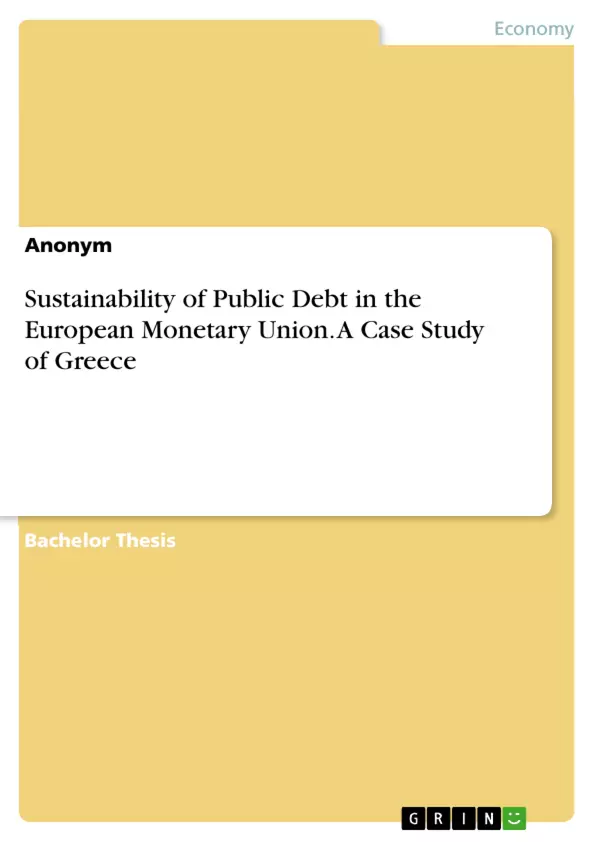This bachelor thesis discusses the sustainability of government debt on a theoretical level with the model of the government budget constraint and its application in a case study. Therefore, the situation of Greece is used as a prime example for the current sovereign debt crisis in the European Monetary Union. It points out with quantitative data, what has led to the high public debt in Greece and what are the consequences of this debt accumulation. For this the sustainability and the development of government debt and its determinants will be analysed. In conclusion, it discusses the options to escape of this sovereign debt crisis for Greece and the European Monetary Union as a whole.
In March 2012 Greece received another bailout loan of 144.7 billion euro from the European Financial Stability Facility (EFSF) and 19.8 billion euro from the IMF in several tranches until 2014 after a worsening recession and the missing implementation of the conditions. In July 2015 the European Commission arranged to mobilise more than 35 billion euro until 2020, while they already paid out up to this point 4.4 billion euro (European Commission 2015). Still the problem has not been solved yet and Greece is still not able to get control of its debt by itself.
The government debt is a relevant topic in economics and has become even more relevant since the outbreak of the European sovereign debt crisis. Further research in the issue of government debt could help us to understand how government-debt crisis develop, how the current sovereign debt crisis may be solved as well as how we could prevent from future crises. To understand the problem of high debt, we also need to understand the necessity of public debt, the arithmetic behind it and its implications on the economy of a country and the whole economic system.
Inhaltsverzeichnis (Table of Contents)
- Introduction
- The Public Debt Model
- The Government Budget Constraint
- Sustainability of the Public Debt
- General Dynamics
- Monetization of Debt
- The Fiscal Theory of the Price Level (FTPL)
- Special Case of a Monetary Union
- Common Monetary Policy
- Budget Rules in the EMU
- No Bailout Clause in the EMU
- Result
- Case Study of Greece
- Development of the Government Budget Constraint
- Government Debt Development
- Government Deficit Development
- Net Government Lending/Borrowing
- Interest-Growth Differential
- Monetary Policy in the EMU
- Result
- Welfare Implications of Public Debt
- Crowding-out Effect
- Economic Growth
- Limitations of Policy Discretion
- Redistribution Effect
- Result
- Rationale of Public Debt
- Business-cycle Smoothing
- Intertemporal Burden Sharing
- Political Process
- Result
- Development of the Government Budget Constraint
- Policy Options for Greece and the EMU
- Credible Budget Rules
- Debt Default
- Money Finance
- Structural Reform, Austerity Measures and Affirmative Actions
- Expansive Monetary Policy despite of a Liquidity Trap
- Expansive Fiscal Policy despite of high Debt
Zielsetzung und Themenschwerpunkte (Objectives and Key Themes)
This bachelor thesis aims to explore the sustainability of government debt through a theoretical framework and its practical application in a case study. The case study focuses on the situation of Greece, offering a prime example of the current sovereign debt crisis in the European Monetary Union. The analysis delves into the factors contributing to Greece's high public debt and its consequences.
- Sustainability of Public Debt
- Government Budget Constraint
- Fiscal Theory of the Price Level
- Government Debt Dynamics
- Welfare Implications of Public Debt
Zusammenfassung der Kapitel (Chapter Summaries)
The thesis begins with an introduction outlining the topic and its relevance. Chapter 2 delves into the public debt model, specifically examining the government budget constraint and its relation to debt sustainability. This chapter covers concepts such as general dynamics, monetization of debt, and the Fiscal Theory of the Price Level. Chapter 3 presents a case study of Greece, analyzing the development of the government budget constraint, its impact on welfare, and the rationale behind public debt. This chapter explores topics such as crowding-out effects, economic growth, and policy limitations.
Schlüsselwörter (Keywords)
The key terms and concepts explored in this thesis include government debt sustainability, government budget constraint, fiscal theory of the price level, sovereign debt crisis, case study of Greece, European Monetary Union, welfare implications, crowding-out effect, and economic growth.
Frequently Asked Questions
What is the "Government Budget Constraint"?
It is a theoretical model used to analyze the sustainability of government debt by looking at the relationship between spending, taxation, and debt accumulation.
Why is Greece used as a case study in this thesis?
Greece serves as a prime example of a sovereign debt crisis within the European Monetary Union (EMU), illustrating the challenges of debt sustainability.
What are the welfare implications of high public debt?
High public debt can lead to the "crowding-out effect," reduced economic growth, and limitations on a government's policy discretion.
What is the "Fiscal Theory of the Price Level" (FTPL)?
It is a theory explored in the thesis that relates fiscal policy and government debt levels to the overall price level in an economy.
What options does Greece have to escape the debt crisis?
Options discussed include structural reforms, austerity measures, debt default, or credible budget rules within the EMU framework.
What is the "No Bailout Clause" in the EMU?
It is a rule intended to prevent member states from being responsible for the debts of other members, though its application has been challenged during crises.
- Quote paper
- Anonym (Author), 2015, Sustainability of Public Debt in the European Monetary Union. A Case Study of Greece, Munich, GRIN Verlag, https://www.grin.com/document/353300



